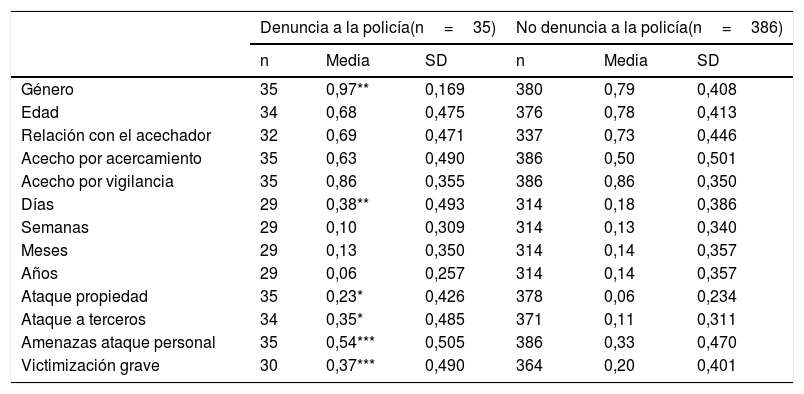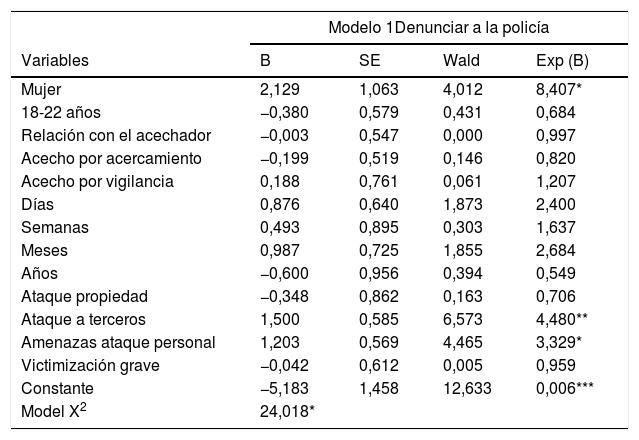La tasa de denuncia policial del delito de acecho en España es baja. El presente trabajo pretende conocer qué factores influyen en la decisión de denunciar el hecho victimizante a instancias policiales, así como conocer los motivos de no denuncia.
Material y métodosUn total de 1.773 estudiantes universitarios españoles (71,9% mujeres y 27,4% varones; media de edad 21,35 años; DS=4,493) cumplimentaron una encuesta de victimización de conductas de acecho con el objetivo de conocer la tasa de prevalencia de victimización por acecho, la gravedad del comportamiento y la probabilidad de denuncia.
ResultadosSeiscientos treinta y ocho estudiantes (35,6%) indicaron haber sido víctimas de acecho alguna vez en su vida (79,5% mujeres, media de edad=21,85; DS=5,340). Únicamente 35 víctimas (5,5%) denunció los hechos a la policía. El hecho de ser mujer, recibir amenazas con dañar a terceros, así como amenazas directas fueron las variables que más relación guardaban con denunciar la situación. En relación con aquellas víctimas que no denunciaron los hechos (386) más de la mitad lo justifican por pensar que la situación no era lo suficientemente importante como para poner en conocimiento a la policía.
ConclusionesEl acecho es un fenómeno prevalente, no obstante, la tasa de denuncia a instancias policiales es baja. La gravedad de las conductas experimentadas incrementa la probabilidad de denuncia. En este sentido, es necesaria una concienciación previa sobre el fenómeno del acecho, para prevenir conductas graves y potenciar la visibilidad de este delito.
The rate of reporting the crime of stalking to the police in Spain is low. The present study aims to determine the factors that influence the decision to report the victimizing event to the police, as well as the reasons for non-reporting.
MethodsA total of 1,773 Spanish university students (71.9% female and 27.4% male; mean age 21.35 years; SD=4.493) completed a stalking victimization survey to determine the prevalence rate of stalking victimization, the severity of the behaviour and the likelihood of reporting.
Results638 students (35.6%) reported having been victims of stalking at some time in their lives (79.5% female, mean age=21.85, SD=5.340). Only 35 victims (5.5%) reported the incident to the police. Being a woman, receiving threats of harm to third parties, as well as direct threats were the variables most related to reporting the situation. Of the victims who did not report the events (386), more than half considered that the situation was not important enough to report to the police.
ConclusionsStalking is a prevalent phenomenon, however, the rate of reporting to the police is low. The severity of the behaviours experienced increases the likelihood of reporting. Therefore, it is necessary to raise awareness of the phenomenon of stalking to prevent serious behaviours and enhance the visibility of this crime.
Artículo
Comprando el artículo el PDF del mismo podrá ser descargado
Precio 19,34 €
Comprar ahora







